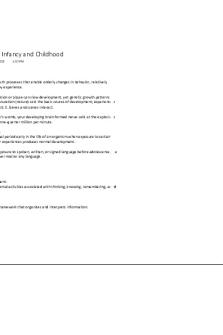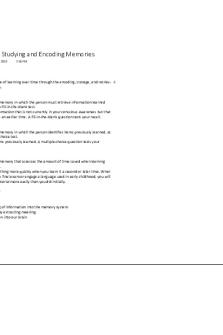Module 11 - Kristy Huntley - Introduction to Psychology : PSYC 1111 Textbook: Myers and PDF

| Title | Module 11 - Kristy Huntley - Introduction to Psychology : PSYC 1111 Textbook: Myers and |
|---|---|
| Author | Scott Bauman |
| Course | Introduction To Psychology |
| Institution | University of New Haven |
| Pages | 5 |
| File Size | 225.9 KB |
| File Type | |
| Total Downloads | 11 |
| Total Views | 130 |
Summary
Kristy Huntley - Introduction to Psychology : PSYC 1111
Textbook: Myers and DeWall, Exploring Psychology 10e in Modules
-----
Module 11 - Textbook Notes...
Description
Module 11 : Infancy and Childhood Friday, September 13, 2019
1:57 PM
Maturation: - Biological growth processes that enable orderly changes in behavior, relatively uninfluenced by experience. - Severe deprivation or abuse can slow development, yet genetic growth patterns are inborn. Maturation (nature) sets the basic course of development; experience e (nurture) adjusts it. Genes and scenes interact. - In your mother's womb, your developing brain formed nerve cells at the explosiv e rate of nearly one-quarter million per minute. - Critical Period: ○ An optimal period early in the life of an organism when exposure to certain stimuli or experiences produces normal development. - Lacking any exposure to spoken, written, or signed language before adolescence, a person will never master any language. Infantile Amnesia: - Up to 3.5 - 7 Cognitive Development: Cognitive: All the mental activities associated with thinking, knowing, remembering, an nd communicating. Schemas: - A concept or framework that organizes and interprets information. Assimilation:
- Interpreting our new experiences in terms of our existing schemas. Accommodate: - In developmental psychology, adapting our current understandings (schemas) to incorporate new information. - In sensation and perception, the process by which the eye's lens changes shape to o focus near or far objects on the retina. Sensorimotor Stage: - In Piaget's theory, the stage (from birth to nearly 2 years of age) during which infants know the world mostly in terms of their sensory impressions and motor activities. - Object Permanence: ○ The awareness that things continue to exist even when not perceived. ○ Infants younger than 6 months seldom understand that things continue to exist when they are out of sight. But for this older infant, out of sight is definitely not out of mind. Preoperational Stage: - In Piaget's theory, the state (from about 2 to about 6 or 7 years of age) during which a child learns to use language but does not yet comprehend the mental operations of concrete logic. Egocentrism: - In Piaget's theory, the preoperational child's difficulty taking another's point of view. Theory of Mind: - People's ideas about their own and others' mental states -- about their feelings, perceptions, and thoughts, and the behaviors these might predict. Cognitive Operational Stage: - In Piaget's theory, the stage of cognitive development (from about 7 to 11 years of age) during which children gain the mental operations that enable them to think l i ll b t t t
logically about concrete events. ○ Begin to understand mathematical transformations and conservation. Formal Operational Stage: - In Piaget's theory, the stage of cognitive development (normally beginning about age 12) during which people begin to think logically about abstract concepts.
LEFT OFF : Autism Spectrum Disorder Autism Spectrum Disorder (ASD): - A disorder that appears in childhood and is marked by significant deficiencies in communication and social interaction, and by rigidly fixated interests and repetitive behaviors. St
A i t
Stranger Anxiety: - The fear of strangers that infants commonly display, beginning by about 8 month s of age. Attachment: - An emotional tie with another person;...
Similar Free PDFs

PSYC 1111 - Journal 2
- 2 Pages

Final-Exam PSYC1111 - psyc 1111
- 11 Pages

introduction to psychology
- 70 Pages

introduction to psychology
- 39 Pages

Introduction to Psychology
- 46 Pages

An introduction to Psychology
- 4 Pages

Myers Psychology Vocab
- 17 Pages

Introduction TO Psychology
- 10 Pages

Introduction to Psychology Notes
- 29 Pages
Popular Institutions
- Tinajero National High School - Annex
- Politeknik Caltex Riau
- Yokohama City University
- SGT University
- University of Al-Qadisiyah
- Divine Word College of Vigan
- Techniek College Rotterdam
- Universidade de Santiago
- Universiti Teknologi MARA Cawangan Johor Kampus Pasir Gudang
- Poltekkes Kemenkes Yogyakarta
- Baguio City National High School
- Colegio san marcos
- preparatoria uno
- Centro de Bachillerato Tecnológico Industrial y de Servicios No. 107
- Dalian Maritime University
- Quang Trung Secondary School
- Colegio Tecnológico en Informática
- Corporación Regional de Educación Superior
- Grupo CEDVA
- Dar Al Uloom University
- Centro de Estudios Preuniversitarios de la Universidad Nacional de Ingeniería
- 上智大学
- Aakash International School, Nuna Majara
- San Felipe Neri Catholic School
- Kang Chiao International School - New Taipei City
- Misamis Occidental National High School
- Institución Educativa Escuela Normal Juan Ladrilleros
- Kolehiyo ng Pantukan
- Batanes State College
- Instituto Continental
- Sekolah Menengah Kejuruan Kesehatan Kaltara (Tarakan)
- Colegio de La Inmaculada Concepcion - Cebu






